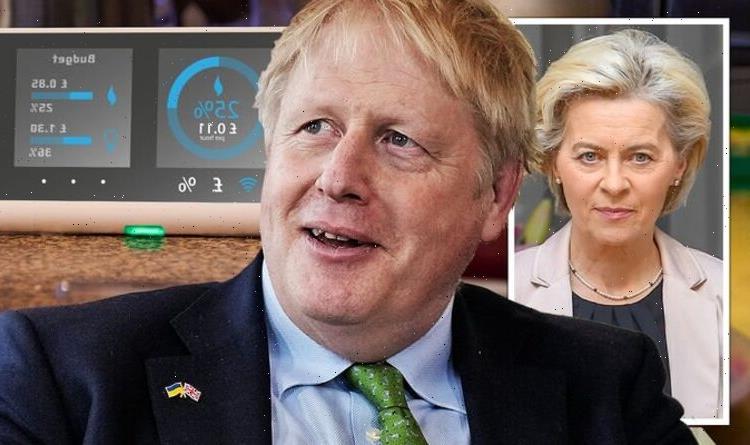Energy discussions causing 'tension' in government says expert
We use your sign-up to provide content in ways you’ve consented to and to improve our understanding of you. This may include adverts from us and 3rd parties based on our understanding. You can unsubscribe at any time. More info
The assertion came from UK100 — a membership organisation of mayors and council leaders who represent some 37 million people across nearly 100 towns and cities. They have claimed that local authorities are “best placed to deliver a raft of measures to loosen Putin’s grip on the UK”. They lauded the announcement in Chancellor Rishi Sunak’s Spring Statement last week that there would be a VAT exemption for measures that act to boost household energy efficiency — a move they say will be a “win-win-win”. However, the group added, the rest of the budget is a “mixed bag” for local net zero, with additional and long-term investment still needed for both public transport and the Hubs established to support municipal authorities in developing net zero projects that can attract commercial investment.
The local leaders pointed out that around four in five households in the UK are presently powered by gas — with such also accounting for as much as 14 percent of the country’s carbon emissions.
Only eight million of the 29 million homes in the UK, meanwhile, meet the highest energy efficiency standards of an A-rated energy performance certificate.
UK100 said: “British homes are also among the draughtiest in Europe.”
They added that retrofitting draughty existing houses with features like triple glazing and insulation has the potential to cut down on energy consumption and could save those households as much as £400 on their annual bills.


Accordingly, the organisation welcomed the Government’s recent announcement that households investing in upgrades like solar panels, heat pumps and insulation would pay no VAT on such for the next five years, making these energy-efficient improvements affordable to more people.
UK100 CEO Polly Billington said: “We’re delighted to see action on our call to scrap VAT on energy-saving materials.
“This is a welcome boost for retrofit, especially coupled with the Chancellor’s support for energy efficiency as a focus for UK Infrastructure Bank (UKIB) funding.
“Retrofit will boost jobs and skills, increase energy security, and reduce energy bills — all while accelerating progress towards net zero.
“Local authorities are ready to take action and increased support is welcome news.”
UK100 campaign director Rupert George added: “With social housing accounting for more than three in ten homes, ambitious local authorities across the UK are already at the forefront of a retrofit revolution.
“UK100 members like Wiltshire Council, for example, are already showing leadership with a Housing Energy Efficiency Programme to upgrade all existing council housing properties up to EPC level B within ten years.”


The organisation is now calling on the Government to invest more in public transport — saying that doing so would help reduce the UK’s reliance on Russian fuels.
More funding in this area would also improve the travel choices of the poorest members of society, they added — unlike the recently announced fuel duty cut, which will disproportionately benefit the richest households across the country.
UK100 assistant chief executive Jason Torrance said: “Rather than cutting fuel duty, the Chancellor must support local authorities to expand, rather than cull, bus services, particularly in rural areas.
“At the same time, acting to reduce the cost of public transport will support more than a third of the lowest-income households that have no car and struggle with everyday travel costs.”
DON’T MISS:
Brexit fury! EU takes legal action on UK’s ‘discriminatory’ energy [REPORT]
WW2 mystery solved as vehicle rises from river after severe drought [INSIGHT]
Morocco offers UK ‘abundant resources’ to slash Russian ties [ANALYSIS]

UK100 is also calling on the Government to commit more funding in the long-term to the Local Net Zero Hubs that were created to promote and support zero-carbon projects.
At present, these centres — which replaced the former Energy Hubs — will have financial support up until the end of March next year.
Ms Billington called the omission of the hubs from the Spring Statement “concerning”.
She added: “The energy hubs have been vital sources of support and coordination for local authorities seeking to turn ambition into action and their broadened remit is welcome on net zero.
“But to be effective they need adequate, long-term funding. They also need to be empowered with a clearly defined role. We didn’t get that.”
A report from PwC published earlier this month found that investing in net zero measures on a municipal level would produce far better environmental, economic and social results than a national, “one-size-fits-all” approach — and would do so more at a lower cost.
Dr Karen Barrass, UK100’s policy and research manager, said: “The Local Net Zero Hubs need a clearly defined role and sustained funding to help unlock the power of local authorities to tackle the climate crisis and reduce the UK’s reliance on imported oil and gas.”
Source: Read Full Article


